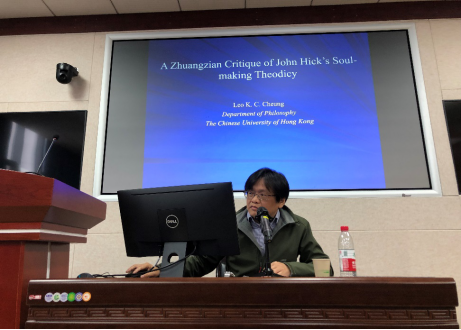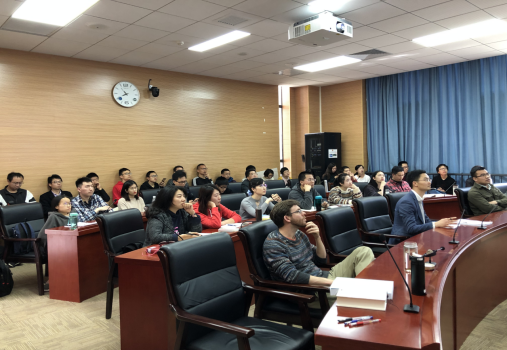Professor Leo K. C. Cheung’s Lecture at the School of Philosophy: “A Zhuangzian Critique of John Hick’s Theodicy”
On Thursday 15:00 p.m, April 4, 2019, Professor Leo K. C. Cheung, Director of Philosophy Department of the Chinese University of Hong Kong, gave a lecture at B214 of the School of Philosophy, at the invitation of Su Dechao, Professor of Foreign Philosophy. The theme of the lecture was "A Zhuangzian Critique of John Hick’s Theodicy," based on a journal article forthcoming in Sophia. Professor Su Dechao and Associate Professor Samuel Kahn and Zheng Zemian attended the lecture.

John Hick (1985, 1990) has put forward an Irenaean1 theodicy, which is also called “the soul-making theodicy.” The soul-making theodicy defends the omnipotence, omniscience and all-goodness of God in the face of evil. It holds that the end of the creation process is the development of human beings into children of God, and that, to achieve the end, an evil-dependent soul-making process must be employed. The evil-dependent soul-making process gives rise to a world, in which there must be evils (and suffering) and evil-dependent values. Such a world may be called “an Irenaean world.” Hick thinks that the actual world is an Irenaean world (and Professor Cheung agrees with him on this point). The soul-making theodicy then concludes that, because the end is so valuable, the omnipotent and omniscient creator’s having created an Irenaean world, and thus not having prevented the existence of evil, is morally justified and not in conflict with her being all-good.
After introducing Hick’s argument, Professor Cheung quoted the Zhuangzi:
When the springs dry up and the fish are left stranded on the ground, they spew each other with moisture and wet each other down with spit—but it would be much better if they could forget each other in the rivers and lakes. Instead of praising Yao and condemning Chieh, it would be better to forget both of them and transform yourself with the Way [the dao]. (Watson 2013: 44)
Here, Zhuangzi offers two descriptions of two different worlds, respectively. In one of the worlds, there are instances of evil (and suffering), as well as evil-dependent values, including the love and care the fishes offer to one another. This is an Irenaean world. Another world is one without any instances of evil and evil-dependent values, and yet it has evil-independent values. We may call this world “a Zhuangzian world.” Actually, a Zhuangzian world may be defined as a world without evils and evil-dependent values, but with evil-independent values. According to this definition, a Zhuangzian world need not be the one described by Zhuangzi in the passage, although the latter is of course a Zhuangzian world.

Zhuangzi in the above passage amounts to claiming that a Zhuangzian world is better than an Irenaean world. Professor Cheung thinks that we do not have to endorse all of Zhuangzi’s views, but we maintain that a Zhuangzian world is at least apparently metaphysically possible, and that Zhuangzi’s arguments, and other related arguments, for the metaphysical possibility of a Zhuangzian world are very persuasive. Professor Cheung employs the notion of a Zhuangzian world and some related views in the Zhuangzi to argue against Hick’s soul-making theodicy. The main argument consists in this: It is Hick’s burden to prove either that a Zhuangzian world is metaphysically impossible, or that the actual world, as an Irenaean world, is better than any Zhuangzian world. However, there are not any resources in his soul-making theodicy that can provide any such proofs. Therefore, Hick has not justified, nor rationally established, his soul-making theodicy.
At the end of the lecture, Professor Leo K. C. Cheung interacted with the graduate students on the issues related to the lecture, such as John Hick's theology in different situations inside and outside the faith. Professor Zheng Zemian summarized the lecture and wished that Professor Leo K. C. Cheung would come to the School of Philosophy of Wuhan University again to give lectures. (Written by Liu Xu)



